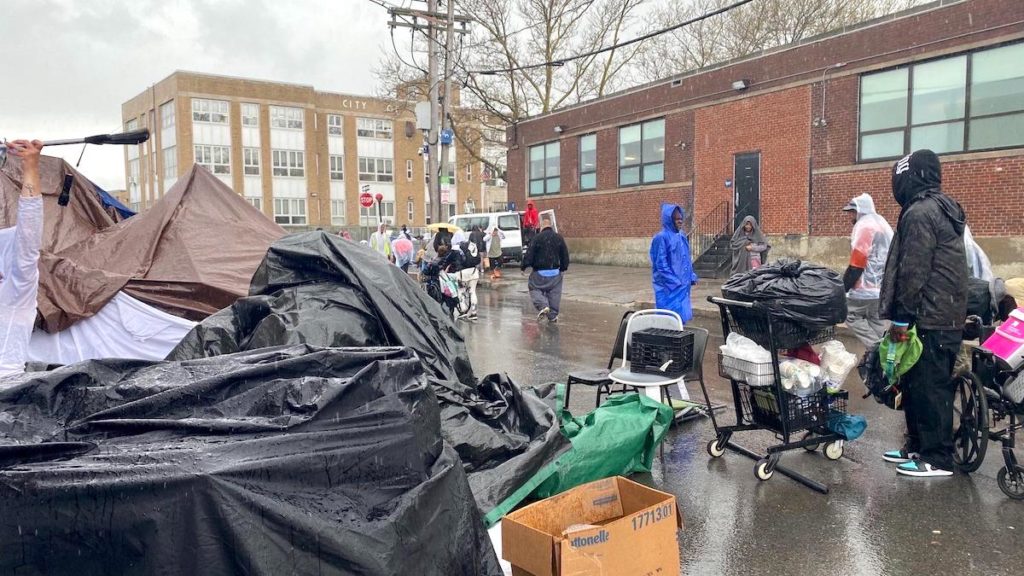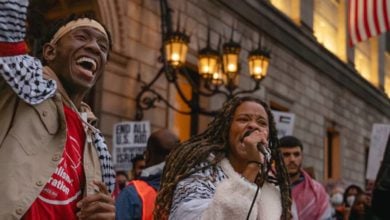The author is a case manager working with homeless patients in Boston.
Time is running out for the Roundhouse Hotel. The old building located at the intersection of Massachusetts Avenue and Melnea Cass Boulevard in Boston was repurposed for crisis stabilization, addiction treatment and transitional housing for Boston’s homeless in January 2022. After only a year and a half, it will be the first of many sites closing, with no plan for the 60 individuals currently under its care, or the dozens more waiting to claim a bed there.
“Mass and Cass,” also called the “Methadone Mile” by locals, is the epicenter of Boston’s housing crisis and opioid epidemic. For the past nine years, hundreds of homeless people have built encampments along this intersection. People clutch their belongings in lines winding around shelters, waiting for a meal, a shower, medicine, and if lucky, a bed for the night. Low-threshold supportive housing like the Roundhouse Hotel accepts people with the highest needs, gives them a pathway to permanent housing and a room to stay for longer than shelters can.
Addressing homelessness: the Wu administration’s failing campaign promise
When Michelle Wu was elected mayor in November 2021, she made a promise that every tent on Mass and Cass would come down. Her plan to address the homeless crisis — which she called “a turning point” in Boston’s approach — had two parts: expanding low-threshold supportive housing throughout the city, and partnering with the police to remove tents.

This summer, the Wu administration is poised to abandon even more people to the streets as their main initiative at the Roundhouse Hotel expires. The clinical services provided there are headed by Boston Medical Center, which blames a lack of city funding for the program ending in late July.
“They talk the talk, but at the end of the day the city isn’t taking the necessary steps,” said Nefeline Castillo, a case manager working with homeless patients in Boston. “They keep cutting funding, they keep denying programs and bills that could actually help people who are suffering.” Castillo continued, “I don’t think the state cares, to be honest. When we start to see a ray of hope, they start to sweep it away.”
Boston’s public housing is barely an option
The closing of the Roundhouse Hotel is only the most recent addition to Boston’s crumbling housing welfare infrastructure. Section 8 vouchers, which ensure that low-income individuals pay only 30% of their income for rent, are difficult to obtain. The application process is notoriously rigorous, which alienates immigrants, the elderly, and disabled people who are most in need of public housing. Applicants can wait eight years or more for acceptance, and acceptance isn’t guaranteed.
The alternative is applying for a subsidized unit. Unlike vouchers, which renters own and can take to different units, subsidized units are specific to particular buildings. Project-based apartments designate a select number of units for people whose incomes are below 30% of the area’s median income. Due to the scarcity of subsidized units, they are mainly won through lotteries which also leave renters in the lurch for years at a time.
Last month, the city passed a law that eliminated the eviction protections offered to low-income people through Massachusetts’ Residential Assistance for Families in Transition Program. Previously, people who applied for RAFT emergency funding to cover overdue rent and utilities were protected from evictions during the application process. These provisions were essential for working-class people during the height of the pandemic, and they remain so as rents rise, inflation worsens and wages remain stagnant.
Under socialism, housing is a human right
The Wu administration has proven, contrary to their word, that addressing the housing crisis is not a priority. If it were, the administration would implement rent caps or use eminent domain to house people in the 7,000 empty units collecting dust throughout Boston. If they did, there would still be plenty of rooms left over!
The city will not put permanent solutions in place without a fight because these solutions do not turn a profit. Instead, poor and working people are left with little if any support. By putting the immense profits of developers and landlords over the needs of working-class people, the Wu administration is defending their exploitation.
Boston’s housing crisis will continue to worsen until we replace the profit-driven system of housing with a system that puts working-class people first. A socialist government would guarantee a home to every person by decommodifying and socializing housing, abolishing the rental market and greedy landlords, and giving ownership to the collective working class. Public housing would be dignified, adequately funded and planned by and for the working people.
“People have always needed housing, but over the years I have watched the desperation grow,” said Castillo. “Housing is a human right. Everyone deserves a house and food to eat. It’s a basic need.”





